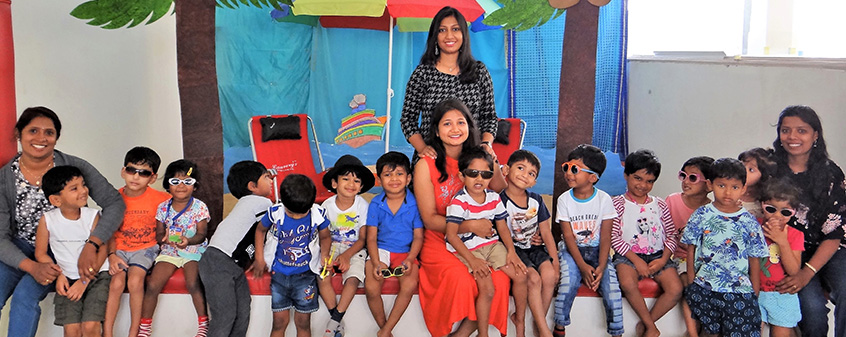Every parent wants to educate their children at home due to the flexibility, safety, and customisation that homeschooling offers. In this article, we will guide you on teaching preschoolers at home.
How to teach preschoolers at home
Understand your child: Homeschooling allows parents and tutors to design the curriculum and activities as per the child’s interest. Thus, it is crucial to understand your child’s learning style and abilities to help them learn better and faster. The five major learning styles are: visual, auditory, interpersonal, logical, and intrapersonal. Identifying your child’s technique will help the child to work along with their strengths.
Devise a Plan of Action: Teaching kids at home has its benefits, but is also challenging. Hence, as a parent, you must have a precise plan on how you want to go about it. Parents can be the primary tutor of their child, or register them in online playgroups and online preschool programs, where external tutors are the primary tutors. Along with that, you need to also prepare the child for this and help them understand the new learning method.
Evaluate: Evaluation of whether your teaching methods are working or not is crucial for homeschooling. However, this does not mean you must traditionally test your children with exams and marks. However, you can devise innovative ways to understand your child’s progress, and how you can teach them better. Since they are only in kindergarten, there is no need for them to be perfect and remember everything. The goal is to develop a learning habit and formative skills.
Teaching various home activities for nursery kids
Homeschool allows you to conduct fun activities for the child and teach them in creative ways. Here are some activities that can be used to teach preschool children:
Outdoor activities: Outdoors are a great way to learn for visual and interpersonal learners. Since they retain better through spaces and situations,outdoor activities can boost their learning and make it more enjoyable. Outdoor activities within nature and games can help in learning the basics of science and math. For example, counting shells on a beach, or understanding the parts of a plant can be a great way to learn.
Indoor games: Indoor activities can also be a fun way to teach children. Since they are very young, it will not be easy to teach them in the traditional way of books and pencils. Hence, it is more effective to gamify learning and teaching. This ensures that education is not stressful and allows children to have fun.
Online Kindergarten: Registering your child with an online school can also be helpful to provide a study environment to your child without compromising their safety. Online playschool will allow children to make friends and engage with other people.
Soft skill development: Apart from the formal subjects of language and mathematics, it is essential to teach children soft skills. Balancing, walking, and communication are vital skills that preschool children should develop. Children of this age are still learning to develop their sensory function fully, and teaching can help them grow in a better place.
What are the benefits of preschool learning
It is natural for parents to be sceptical about whether homeschooling will be beneficial for their child. But teaching nursery kids at home can have various benefits and help in developing the intelligence and skills of a child. Some of the key benefits are:
Safety: Children’s safety is one of the biggest concerns for parents. Health, hygiene, and other factors are crucial for children’s well being in a school. However, teaching kids at home ensures that children are in a safe environment and are learning from the comfort of their homes.
Customised studying: School’s teaching design is generic to suit a group of people. However, every child has a unique learning style and learns at different speeds. But group schools function at a set pace and do not provide any flexibility. Homeschooling in preschool ensures that your child learns at a pace designed for them, which is crucial in the formative years.
Personal attention: A private tutor or parent-tutoring will focus on the child. This allows your child to get complete attention and learn in a focused manner. Schools are not able to provide personalised attention due to the vast number of children.
Bonding: Learning within a safe family environment is a great way to bond with the child. It allows parents and children to connect at every step of the learning experience and ensures the participation of everyone.
Cost-effectivePreschools with good quality education can be very expensive. Homeschooling can help save money without compromising on the quality of learning.
Teaching kids at home can seem like a difficult task. However, the benefits outweigh the additional steps parents have to take. Use these tips and methods to teach your preschool kids at home and provide the best learning experience for them.














